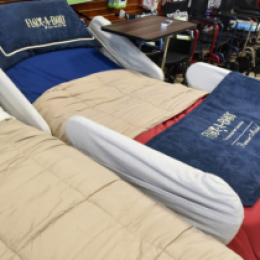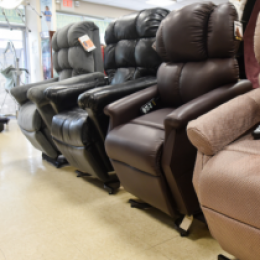
Getting good quality sleep is important because it allows you to be as productive as possible during the day and prevents you from spending the daydreaming about counting sheep. There are many things that can actually hinder you from getting the best sleep that you can. Continue reading to find out the 10 proven tips that you can use to help you sleep better at night.
1. Stick to a Regular Sleep Schedule
Consistently going to sleep at the same time each night can help with your overall sleep quality. It is recommended that adults get seven to eight hours of sleep a night; however, most people typically need more than that. It is also important to try to limit the difference in when you go to sleep on the weeknights and weekends to no more than one hour. This will make sure that your body sticks to a good sleep schedule.
2. Limit Daytime Naps
Although short power naps can benefit you, taking long or even irregular naps can affect your sleep in a negative way. Sleeping during the day can confuse your internal clock meaning that you will have a harder time falling asleep that night. If you choose to take a nap, you should try to limit it to up to 30 minutes. You should also try to avoid taking them later in the day.
3. Don’t Consume Caffeine Late in the Day
It is no secret that most of the United States population consumes caffeine in some way, shape or form. Caffeine has numerous benefits, and a single dose can even help enhance your focus, energy, and sports performance. However, consuming caffeine too late in the day can cause you to have trouble naturally relaxing later in the night because caffeine stimulates your nervous system. If you are craving something with caffeine in it later in the day, try going for a decaffeinated version or just skip it altogether.
4. Increase Your Bright Light Exposure
Your body has a natural clock known as your circadian rhythm. Your circadian rhythm helps you stay awake during the day and tells you when you need to sleep. Exposing yourself to a bunch of natural light during the day will help your circadian rhythm remain healthy and work properly. This improves your energy throughout the day as well as your sleep quality and duration. To increase your light exposure during the day, you can either get outside or simply open the window or blinds.
5. De-Stress
There are many things that might stress you out during the day. That stress tends to bubble up and follow you to bed. Giving yourself some time at the end of the day to de-stress can help prevent stress from entering your mind as you try to fall asleep. By using relaxation techniques before bed, you can improve your sleep quality and can even treat insomnia. Strategies that you can use include listening to relaxing music, reading a book, taking a bath, meditating and deep breathing. You can try out multiple different strategies until you find the one(s) that work best for you.
6. Exercise
Getting outside and going for a walk is not only good for your physical health but it will also help you fall asleep at night easier. Exercising boosts your natural sleep hormones such as melatonin. You just want to make sure that you are not exercising too close to bedtime as it will also keep you awake at night.
7. Reduce Blue Light Exposure
While exposure to light during the day can be beneficial, the light at night has the opposite effect. This is because your body will trick itself into thinking that it is daytime. Limiting your light exposure at night is important and that includes blue light. Blue light can be found in electronic devices such as smartphones and computers. There are a few ways in which you can reduce your blue light exposure. Those include wearing glasses that block blue light, downloading apps that block blue light or stopping watching TV and turn off bright lights two hours before you go to bed.
8. Do Not Eat Too Late
Eating too late in the day can make it harder for you to fall asleep because your body is still trying to digest the big dinner that you ate. To keep food-related sleep disruptions low, do not eat dinner too close to bedtime, and if you need a snack, do not eat heavy foods; go for a light and healthy option instead.
9. Avoid Alcohol
Although many people believe that alcohol makes you sleepy, it has the opposite effect. It is a stimulant that disrupts your sleep. Alcohol affects your brain in a way that lowers your quality of sleep. Therefore, if you avoid alcohol leading up to your bedtime, it can be beneficial for you.
10. Get a Comfortable Bed/Mattress (Flexabed)
Getting a good night’s sleep is important and sleeping in the wrong bed can hinder that. As you get older, you will start noticing that you are waking up with more back pain. This will alter how your day goes and therefore could affect how you go to sleep at night. Investing in a good bed such as the Flexabed can help you get the best night’s sleep that you can. If you are looking for more information on the Flexabed or if you are interested in getting one, you can contact us.
By utilizing the tips that are listed above, you will be able to get the best night’s sleep that you can. Having good sleep hygiene will help you get more things done during the day as you will not be so inclined to lay around or take an extended nap.





0 comments